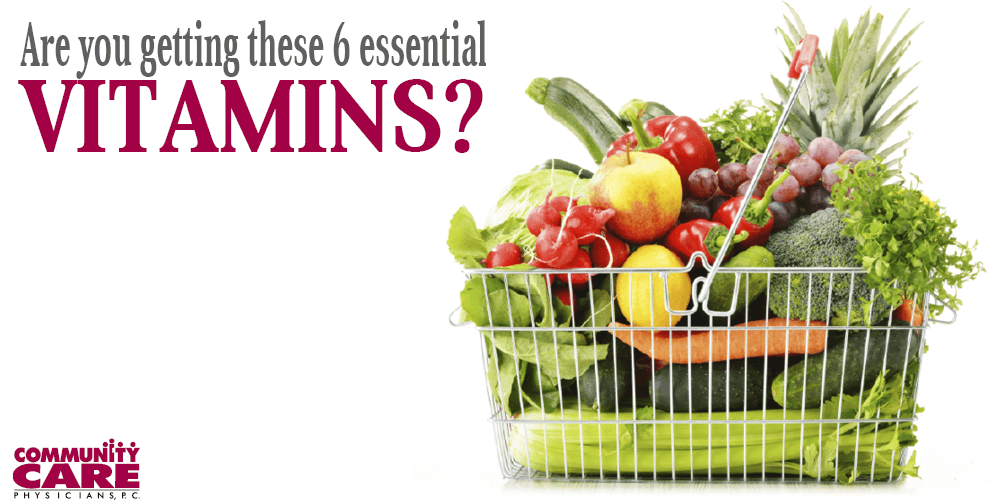
About 10% of the general population has nutrition deficiencies for certain vitamins and minerals, according to the CDC. Vitamins and minerals are essential nutrients our bodies need in small amounts to work properly. Most of the time, essential vitamins can be consumed through a balanced diet, but sometimes it's harder to get certain vitamins and minerals than it is others. Here are 6 vitamins you need that you might not be getting from your regular diet:
-
Vitamin B12.
Why You Need It: Vitamin B12 is an essential nutrient for our nerve and blood cells. B12 helps our bodies produce energy and DNA. B12 also prevents a type of anemia called megaloblastic anemia that makes people tired and weak. As you age, the lower levels of acid in your stomach prevent the proper breakdown of proteins and do not release as much B12 from the foods you consume.
How To Get It: Older individuals, specifically those over 50, should take a B12 vitamin daily or ask their doctor about other supplementation. Otherwise, you can get B12 from foods like fish, poultry, eggs, milk, meat, and other milk products. For vegans and vegetarians it's possible to get B12 from fortified foods like non-dairy milks, meat substitutes, and breakfast cereals. Just make sure they are fortified. If you can't find these foods or don't eat them, taking a daily B12 vitamin is a good idea.
-
Vitamin D.
Why You Need It: Vitamin D helps control the amount of calcium and phosphate in the body, which are needed to keep your bones and teeth healthy. Having a vitamin D deficiency can damage the way your body absorbs calcium and phosphorus and can lead to certain types of cancers and heart disease. Generally, an average adult should get about 600 – 800 IU, according to the National Institutes of Health.
How To Get It: The body makes vitamin D when skin is directly exposed to the sun. Very few foods naturally have vitamin D so it's best to take a daily supplement for bone health. Fortified foods that provide the most vitamin D include: fatty fish such as salmon, tuna and mackerel, mushrooms that are vitamin D fortified, almost all milk supply (not cheese and ice cream), and some breakfast cereals.
-
Folic Acid or Folate.
Why You Need It: Folic acid is a type of B vitamin that helps your body produce and maintain new cells. It also prevents changes in your DNA that could lead to cancer. Folic acid is particularly important during pregnancy to prevent birth defects.
How To Get It: Folic acid can typically be found in foods such as dried beans, peas, lentils, oranges, whole-wheat products, liver, asparagus, beets, broccoli, brussels sprouts, and spinach. Remember, fruits and vegetables are the best sources for folic acid.
-
Vitamin B6.
Why You Need It: Vitamin B6 helps make red blood cells that are essential for metabolizing foods, helping form hemoglobin, stabilizing blood sugar levels, and immune function. Vitamin B6 helps our muscles use energy as well as helps regulate sleep, appetite and mood. A vitamin B6 deficiency can lead to nerve damage in the hands and feet.
How To Get It: Although vitamin B6 deficiency is rare in the U.S., it can be found naturally in many foods and is added to other foods. You can get the recommended amount of B6 by eating a variety of foods including: poultry, fish, liver, potatoes and other starchy vegetables, and fruits. You can also take a B6 vitamin dietary supplement in the form of pyridoxine.
-
Calcium.
Why You Need It: Calcium is essential for strong bones and teeth and preventing osteoporosis in our older age. We release calcium from our bodies every day through our skin, nails, hair, sweat and waste. When our bodies release calcium, we cannot produce new calcium so it's important to get it from the foods we eat every day. If we do not get the recommended amount of calcium, it gets taken from our bones, leading to osteoporosis and other health problems. Adults under 50 should get about 1,000 mg of calcium per day. Adults 51 and older should get about 1,200, according the National Osteoporosis Foundation.
How To Get It: You can get calcium from dairy products like plain yogurt. You can also get calcium from dark leafy greens such as kale and Chinese cabbage, but not spinach. The calcium found in spinach is not well absorbed by the body because of the high amounts of oxalates it contains. These natural compounds bind with calcium and make it difficult for your body to absorb it. For vegans and vegetarians, another good source of calcium is fortified soy and almond milks and tofu. If you do not think you are getting enough calcium, a dietary supplement can help. If you get enough calcium from the foods you eat, you do not need a supplement, as too much calcium can be dangerous.
-
Iron.
Why You Need It: Proteins in your body use iron to transport oxygen and grow cells. Iron is especially important for women who are pregnant or planning on getting pregnant. Most of the body's iron is found in hemoglobin, the protein in red blood cells that carries oxygen to tissues all over the body. A lack of iron results in anemia.
How To Get It: The best type of iron to get is "heme iron", which is better absorbed by the body. Heme iron can be found in foods such as red meat, fish, and poultry. Non heme iron can be found in plants and sources like lentils and beans.
